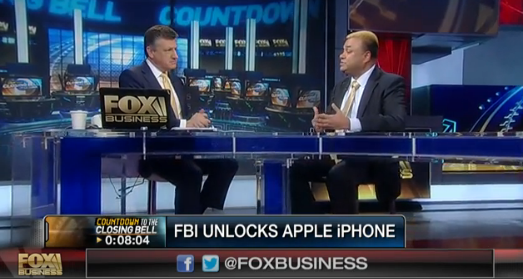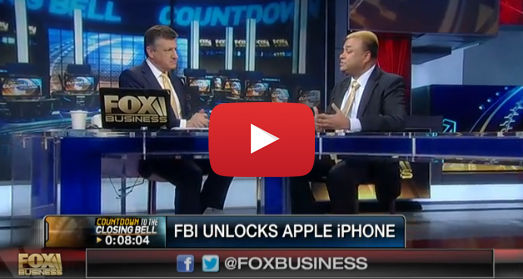
Source: Brainlink’s leader Raj Goel weighs in on Fox Business.
You’ve likely heard a lot about Apple and the FBI’s recently concluded encryption dispute. In order to allow the FBI to access the iPhone of a terrorist suspect in the San Bernardino shooting, a judge ordered Apple to provide a method to bypass the smartphone’s security features. Apple used their constitutional and legal rights to challenge the court order, citing a number of risks that the new software would pose to mobile security.
In the end, the FBI abandoned its bid to force Apple to help unlock the phone as they had found a way in without the company’s assistance. The question is whether Apple really won the fight if the FBI still gained access to the phone after all. {company} founder Raj Goel appeared on Fox Business on March 30th to discuss just that.
“I think Apple won the long game, because, for most of their customers, they’ve proven that they’re fighting for the user,” said Raj. “…ultimately Apple [is] marketing to you, me, business buyers and governments around the world. What they’ve shown is that they have some backbone in pushing back against egregious law enforcement requests.”
In line with Raj’s ongoing commitment to the importance of privacy and security in the modern digital age, he reaffirmed the foundational struggle of this and other security issues, stating, “As Ben Franklin said, and I’m fond of quoting him, ‘Those that trade temporary safety for security deserve neither'”.
Raj went on to explain Apple’s possible responses to the situation, and how they can go about patching the security flaw that was ultimately exploited by the FBI with the help of an unknown third party.
“They’ll either find out from law enforcement, or just find whichever company did this and buy the same vulnerability, either directly or indirectly, and patch it in the next future versions of iOS. ”
While some may consider the practice of continually buying out companies to patch security flaws to be a poor business model, Raj explained that this is actually a common practice in the technology industry. Bug bounties — rewards offered by many companies and software developers by which individuals can receive recognition and compensation for reporting bugs — are used by most global corporations including Microsoft, Google, GM, Ford, and even recently, the Pentagon.
“Every technology corporation has a publicly disclosed bug bounty, and Apple is in a very great position to either hold a bug bounty, or better yet, buy the company because they’ve got enough money to do it,” explained Raj.
Learn more from Raj and {company} about cyber security:
- {company} Security Consulting
- Social Media & Cloud Computing Threats to Privacy, Security & Liberty
- Generating Scheduled Security Compliance Reports
- Are You Googling Your Clients’ Privacy Away?
- “HIPAA and FTC Health Breach Law: Correcting The Perils Of Lax Security”
Are you unsure of your cyber security in the modern business world? Get in touch with the {company} team of technology experts today at {phone} or {email} to learn more about reliable IT security measures.

